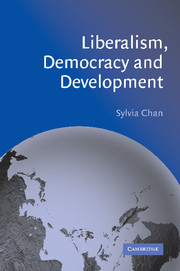Book contents
- Frontmatter
- Contents
- Acknowledgements
- List of abbreviations
- Introduction
- 1 The question: is ‘liberal democracy’ good for economic development?
- Part I The present context of democratisation and decomposing ‘liberal democracy’
- Part II The democracy–development debate: old problem, new thinking
- 4 Constructing an empirical explanation
- 5 The democracy–development debate reconsidered
- 6 Reconstructing an explanation of the Asian success
- 7 Conclusion: moving beyond the question of ‘liberal democracy’
- Bibliography
- Index
5 - The democracy–development debate reconsidered
Published online by Cambridge University Press: 22 September 2009
- Frontmatter
- Contents
- Acknowledgements
- List of abbreviations
- Introduction
- 1 The question: is ‘liberal democracy’ good for economic development?
- Part I The present context of democratisation and decomposing ‘liberal democracy’
- Part II The democracy–development debate: old problem, new thinking
- 4 Constructing an empirical explanation
- 5 The democracy–development debate reconsidered
- 6 Reconstructing an explanation of the Asian success
- 7 Conclusion: moving beyond the question of ‘liberal democracy’
- Bibliography
- Index
Summary
We can now turn to focus on disentangling the democracy–development relationship. While the ‘all good things go together’ camp argue that ‘liberal democracy’ is positively linked with economic development, on the other side are those who argue that there is a necessary/inescapable ‘trade-off’ between democracy and development. What exactly are the elements that are identified in these arguments that make for the ‘link’? How good are these arguments and the links identified?
What follows in sections 5.2 and 5.3 is an examination of the arguments for and against the ‘democracy-is-good-for-development’ thesis. It will become clear the pro- arguments have been based on several things: what I have referred to as ‘security’, ‘stability’ and ‘openness and information’. In these arguments, various political institutions are posited, and the relevance of the ‘economic’ side of liberalism is seen to be more contingent than usually assumed. It will also become clear that the anti- arguments have been based on some conceptually problematic premises. In addition, while ‘economic’ and ‘civil’ liberties figure more prominently in the pro- arguments, it is the political aspect that the anti- arguments focus on. The conceptualisations of the democracy–development link that emerge from this discussion will be summarised in section 5.4, and the empirical discussion in chapter 6 will further elucidate their relevance.
Some preliminary points
Before I explore how scholars have theorised about the causal ‘link’ between democracy and development, there is a preliminary point with regard to a distinction between the deontological and the consequentialist arguments.
- Type
- Chapter
- Information
- Liberalism, Democracy and Development , pp. 130 - 190Publisher: Cambridge University PressPrint publication year: 2002

